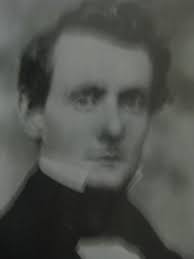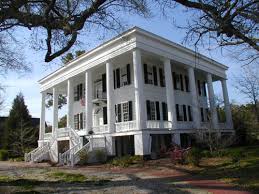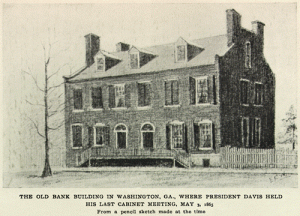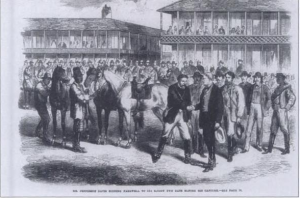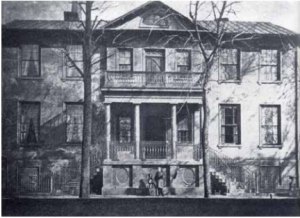Henry Allen Tupper (1828-1902) married my wife’s second great grand aunt, Nancy Johnstone Boyce (1829-1888), the daughter of Ker Boyce. Nancy’s brother, James Petigru Boyce, also a minster, played a key role in Baptist history, as we shall see.
The Early Years
Henry Tupper’s education outside the home was under the care of Dr. Dyer Ball who became a missionary in the East. Ball was his school teacher and Sunday school teacher as well. He was at Ball’s school in 1836 during his eighth year. His closest friend during High School was Henry Hannibal Timrod who became the famous poet. Timrod was a constant inspiration to Henry, but he spent a great deal of time during his high school years in outside sports, such as: running, riding, dancing, swimming, shooting and other related activities. Sports he allowed to interfere with his learning.
The Tupper family attended the First Baptist Church in Charleston, and there he met his friend James Boyce and James’s sister, Nancy. Henry remembered her at church:
Frequently she dressed in white. I often thought that the garb was a fit and beautiful emblem of her simple and pure character. The plainness of her dressing was always to be noted in view of the fact that she was literally doted on by her father, who was probably the wealthiest man in the city, and known by all to be devoted to his children. She was really “the pious, consistent little member of the church.” She visited the poor, sought children for the Sabbath school, and was ready for every good word and work.
Henry went to Madison College, where he was affected by skeptical currents of thought.
The Conversion
Henry’s flirtation with skepticism haunted him. In 1837 he heard Dr. Fuller preach.
I went to the door (of the church), but was afraid to enter. Next morning before breakfast I went and took my seat by the door. Mr. Crawford came to me. The devil took possession of me and I began with my skeptical arguments. He sent Mr. Wyer to me. Though very tender and affectionate, he finally arose and said: “Young man, your infidelity will damn you.” I was greatly offended. Instead of going home to breakfast, I walked out of town full of anger and with the words ringing in my heart—“Will damn you.” I concluded that I would be damned…. I went again to the meeting. Dr. Fuller spoke to me. Sent Mr. Wyer to me, who said: “You are not far from the Kingdom,” but I knew that I would be damned. I talked wildly to mother about my sins and ruin. Went to father’s office, paced up and down the back store praying for deliverance. Tut (my brother Tristram) came in dancing and singing. I burst into tears and told him: “I will be damned, but you must not!” I made him kneel down and prayed for him. Then I hid myself in the hayloft and poured out my distressed spirit to God. Going home, I found that Dr. Fuller had left for me James’ Anxious Inquirer. The devil again entered me. I vowed I would not go again to hear Dr. Fuller and I would resist salvation even if it were forced upon me. Mother chided me kindly but wisely. My conscience pricked me. My sins seemed like a mountain crushing me to perdition. I read The Anxious Inquirer almost all night. I was relieved and alarmed. The idea of a false hope terrified me. In the morning I went to the Inquiry Meeting. In reply to my fears Dr. Fuller said: “If you go to hell I will go with you and we shall preach Jesus there until they turn us out, and then where will we go?
The young Henry Allen Tupper
Henry courted Nancy Boyce and were married on November 1st, 1849 at Kalmia, the summer residence of her father Kerr Boyce, near Graniteville, teh mill town in which Ker had invested. In 1850 Henry was ordained at the Baptist church there.
He was called to the Baptist church in Washington,Georgia, in 1853 The frame church had been built around 1827. In 1853 the church was completely renovated, the form of the cupola was altered, and a baptismal pool was evidently put in the building. The next year two small rooms were built at the rear of the church for the use of the baptismal candidates.
Tupper House, Washington, Georgia (1832)
Ker Boyce in 1853 bought a house for his daughter and son-in law. In 1860 Henry added the colonnade.
H. A. Tupper, Ninth Georgia, C. S. A.
There he became an ardent Confederate. He preached to the Washington, Georgia congregation A Thanksgiving Discourse on Thursday September 1862 on one of the favorite texts of the American Revolution, :the snare is broken.” He denounced “Northern rapacity” and its “peculiar sentiment,” a hatred of the South so intense that only “monstrous barbarities” can satisfy Northern bloodlust. “The struggle only makes us rejoice…that we have escaped form an unnatural and destructive union.”
Jefferson Davis appointed him chaplain to the Georgia Ninth regiment. There Henry shared the misery of army life.
To breakfast at ten o’clock is not very usual in camp, yet the 9th Georgia has been so fashionable to-day. As ordered, we left late encampment yesterday morning and pitched tents here between Centerville and Fairfax (Virginia). Rain on way, but pleasant meditation on Psalm 34:7 (“The angel of the Lord encampeth round about them that fear him, and delivereth them”). Great comfort and sublimity in the things of Almighty power and love stretched over the universe, and under whose shadow the children of men are allowed to trust. After wet time in getting up tent, I had just got snugly ensconced between my blankets when horsemen rode rapidly up to staff tents, and soon I heard from guard: “We are ordered off.” About nine, the regiment started with rapid march. Whither, none knew; but enough for the soldier, “A fight on hand.” No water, no provisions taken, in excessive haste. Chaplain stopped at door and filled canteen and brought a partly eaten pone of stale corn bread. The night black and stormy. Rain came down in a flood. Couldn’t see “hand before the face.” Separated from regiment, let horse pilot way, though started and jumped and whirled round ever and anon, at what I knew not, and she probably as wise. Road to Fairfax Court House the left, to Fairfax Junction right, at intersection; but which the regiment would take I had no idea, and had no idea that would see road when got to crossing. Fortunately halted there by picket, who directed to the right. Soon ran into rear of column and all together we tumbled along. I know no more expressive word. The road like slime. The rain unabated, the darkness above, the same because it could not be blacker. Men tumble down and walked upon; shoes drawn off by mud; several pistols and one sword lost. Still the line crowds on to Fairfax Junction, where arrive about 1 a.m. after such a march as even the severely taxed “Ninth” has never had and will probably never have again. No one has ever experienced the like—seen such a night, had such a march, and, on the whole, been in such a press of circumstances. And when we arrived the announcement is issued from headquarters: “No need of regiments…. Fight over and enemy repulsed.” Next order: “Take the woods and return in morning to camp.” With great difficulty fires are kindled. And there we stood all night in rain—drenched and searching and looking for the day. Never did the light look so beautiful, but the most beautiful of sights was our “camp” again after the remarch, which was made in quick time, and the half dry and hungry 9th made first for their mess chests, at which they got about 10 a.m…. My thoughts, in that horrible darkness and storm, were above this world, I hope. The glorious wings seemed stretched over me. No thought of evil to myself entered my mind.
Where the Confederacy died
May 4, 1865
On May 4, 1865 Jefferson Davis and his cabinet met in the old bank building in Washington, Georgia and dissolved the Confederate government.
While standing on the pavement in front of the building, his horse saddled, his bridle in hand, just ready to mount, he [Davis] was approached by our Baptist minister, the Rev. H. A. Tupper, who spoke some words of encouragement and Christian comfort to him. Mr. Davis, taking him by the hand, said with the greatest fervor, “Though He slay me, yet will I trust in Him.” He mounted his horse and made way.
Henry Allen Tupper shaking the hand of Jefferson Davis,
May 4, 1865
The congregation was impoverished. In 1864 money was repaid to the church in Confederate bills and invested by the treasurer, by order of the church, in Confederate bonds. At the end of the year the treasury was down to $5.00.
H. A. Tupper and Baptist Missions
H. A. Tupper in his later years
In 1872 Henry left the church in Washington, Georgia, to become Corresponding Secretary of the Board of Foreign Missions of the Southern Baptist Convention. Lottie Moon, a missionary in China, corresponded with him, a correspondence which resulted in the Lottie Moon Christmas offering for missions, an offering that since inception has raised $1.5 billion dollars for Baptist missions. Henry also helped establish a mission to Mexico. an act that had consequences for his son and granddaughter. Henry worked in the mission office until 1893, when he retired, and died in Richmond in 1902. He lived at 1002 Capitol St, the house built my Governor Edmund Randolph.
